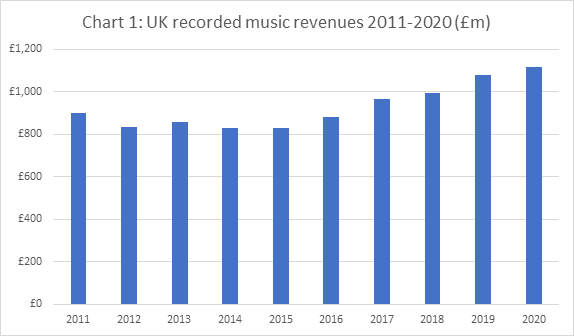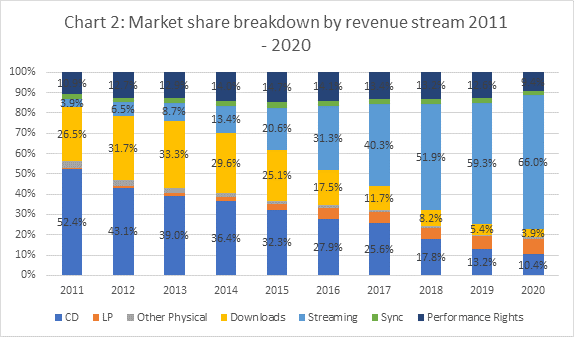The BPI has revealed that UK recorded music revenue rose by 3.8% year-on-year in 2020 to reach £1.118 billion.
This is the highest total since 2006 and the fifth consecutive year of growth, although the rate of revenue growth slowed in 2020 (compared with the 7.3% rise in 2019), due to the effects of the pandemic.
The announcement coincides with the IFPI Global Music Report and the conclusion of the DCMS Committee streaming inquiry.
Revenues from streaming fuelled much of the rise, growing 15.4% to £736.5 million, even as the pandemic slowed overall growth. Physical revenues decreased only marginally by 2.6% to £210.3m. The high value of physical titles cushioned the impact of the volume reduction in physical last year of 24.6%.
Physical was helped by the response of independent shops and specialist chains, who moved their purchasing online during the lockdowns. Revenues from vinyl, boosted by online campaigns, increased by 30.5% to £86.5m – the highest total since 1989. This helped to cushion reduced CD sales income, which fell by 18.5%.
As previously reported, overall music consumption volume grew by 8.2% last year.
In its statement, the BPI said that growing revenues enable record labels to make continued investment in artists and in new music, and suggested that recorded music will have helped to support many artist incomes during the pandemic – an issue at the heart of the streaming inquiry.

Geoff Taylor, chief executive BPI, BRIT Awards & Mercury Prize, said: “The lockdowns inevitably affected financial results in 2020 but, unlike other parts of our industry which were hit very hard, the seamless connectivity of streaming and the enduring love of vinyl meant that recorded music was relatively insulated from its worst effects, and was still able to post growth.
“The ongoing increase in paid subscription streaming fuelled labels’ ability to continue investing in artists. The safe and rapid reopening of live venues is the music community’s critical first priority, but the resilience of recorded music demonstrates the important role it plays in people’s lives even in the midst of the Covid pandemic.”
Revenues from streaming & digital
Revenue of £736.5m (up 15.4%) from streaming, which now accounts for 80% of UK music consumption, was shaped largely by paid subscriptions to streaming services (such as Spotify, Apple, Amazon and Deezer). This rose by 14.7% to £650.3m to reflect the 139 billion audio streams served in 2020 (up 22% on 2019). Ad-funded streaming income grew by 17.5% to £42.4m. Income from video streaming platforms, notably YouTube, were up by a quarter (24.4%) to £43.8m – but that remains just half the amount generated by vinyl.
Revenue from downloads continues to decline as substitution accelerates towards streaming. It fell by 25.1%, with downloaded albums generating just £22.4m (down 27%), and tracks contributing £20.9m (-23%).

Revenues from physical formats: vinyl, CD & cassette
Vinyl remains a star performer, contributing £86.5m to revenues in 2020, up by 30.5%. Purchasing of physical formats largely shifted online in response to the lockdown challenges, with demand boosted by new campaigns such as Love Record Stores, as well as more established annual promotions including Record Store Day, National Album Day, and HMV Vinyl Week. Growing D2C sales also added to the revenue figures.
According to Official Charts Company data, the best-selling vinyl titles in 2020 included LPs by Fleetwood Mac (Rumours), Oasis (What’s The Story) Morning Glory?), and Amy Winehouse (Back To Black), along with new albums by Harry Styles (Fine Line), Kylie Minogue (Disco), AC/DC (Power Up), and Idles (Ultra Mono).
Annual income from vinyl is now closing in on CD revenues, although the latter format still generated over £115m (down 18.5%). Sales of other physical formats, notably cassette, which saw over 150,000 units purchased in 2020, yielded £8.2m in revenues, up 4.4% on the year.
Geoff Taylor said: “Vinyl’s exceptional performance despite retail lockdowns confirms its role as a long-term complement to music streaming. 2021 is likely to be the year in which revenues from LPs overtake those from CDs for the first time in well over three decades – since 1987. In addition to the immediacy and convenience of streaming, fans want to get closer to the artists they love by owning a tangible creation, and more and more of them are discovering how vinyl, or lovingly created CD box-sets, can enhance their experience of music.”
Revenues from sync and performance rights
Sync has been an area of revenue growth for labels in recent years, but stalled in 2020 because of the impact of the pandemic on film production and screenings. Revenue was down 26.4% year-on-year at £20.9m.
Income from performance rights remains substantial at £105.4m, but, again, was down by over a fifth (-22.4%) on the previous 12 months as a result of the severe impact of lockdowns on nightclubs, retail and other areas of public performance.
Geoff Taylor added: “The long-term closure of nightclubs has attracted less media attention than festivals and live music, but they are also very important to music fans and to the music community culturally and socially, contributing a valued component of artist, songwriter and label income. Their safe return as a vibrant part of the night-time Economy is something we must all work hard to achieve.”











